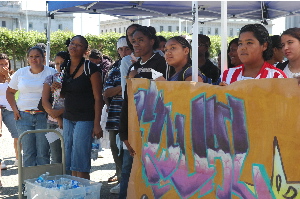The fight for justice for high school students in California continues
  |
|
by Antonio William/PoorNewsNetwork Youth in Media "The funded tree resembles me.." The powerful poetry of Tracy, a Castlemount High School student and member of Youth Together, cut through my down mood. Tracy was one of several students from across the Bay Area who was speaking out against the California High School Exit Exam (CAHSEE) preceding a court action about to be heard in San Francisco last week. I am a high school senior from Oakland and I did not pass the Exit Exam. Had it not been for my editor at POOR Magazine, I wouldn't even been here today, because in a lot of ways I have lost hope. And yet the challenge of this racist, classist law put into place by State Superintendent of schools Jack O' Connell, continues. Attorneys for students attending the worst schools in the state asked the Court of Appeals on Tuesday in San Francisco to reinstate an injunction against the Exit Exam and retroactively award diplomas to as many as 42,000 seniors. This followed an Alameda County Superior Court judge who granted the injunction in May, which halted the diploma penalty for the Class of 2006 because he found many students had not had an equal opportunity to learn the material being tested. The California Supreme Court suspended that injunction on May 24th and the issue was transferred to the Court of Appeals. The Lawyers from Morrison & Foerster who are representing the students suing the state over the Exit Exam argued that some schools failed to adequately teach students the material on the exam. “Denying them diplomas for flunking the test is an unfair punishment”, said Arturo Gonzalez, one of the lead attorneys for the students. "You can't blame the kids”, Gonzalez said. The funny thing is, if you listen to the words of Jack O'Connell's office you would think that in fact you can “blame the kids” because they continue to say that graduating seniors who lack basic math and English skills demean the value of the state's high school degree. I am not sure what they mean by that. I worked hard in school. I attended all my classes and I actually got good grades. How is that demeaning? I would argue that the people this test demeans are hard-working students who are trying to get an education. I am also one of those kids who came from an "underserved school". Our school didn't have a lot of resources and we had teachers who were just out of school and didn't have a lot of experience in the classroom. However, we actually had a lot of art in our school and a lot of parent volunteers who really cared. The point is that everyone who does well in school isn’t always able to pass the tests. So the real problem here is the tests and the fact that that is how they decide whether a student should get a diploma, which is just wrong. My mind came back to the powerful group of student activists from Youth Together who had gathered on the grass outside of the Superior Court in San Francisco last week. “If we meet all of the students requirements, don't we deserve to walk across the stage?", Jennifer, another high school student from Oakland and member of Youth Together, called out to the crowd. Yes, I thought. Unfortunately, the people in control of our educational system in the State of California don't put any weight on what we, as students in the system, deserve. |



